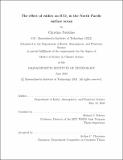The effect of eddies on fCO₂ in the North Pacific surface ocean
Author(s)
Padalino, Christine
DownloadThesis PDF (7.891Mb)
Advisor
Follows, Michael J.
Terms of use
Metadata
Show full item recordAbstract
We investigate the impact of mesoscale eddies in the North Pacific on surface ocean fCO₂ using the in-situ measurements from the Surface Ocean CO₂ Atlas (SOCAT) to inform the importance of the mesoscale dynamics on global CO₂ fluxes. We sort SOCAT measurements from 2000-2019 by whether or not they are in an eddy, per- form basin scale analysis, and present case studies. The results show lower fCO₂ in both anticyclones and cyclones compared to the background ocean, with the mag- nitude of the anomaly varying seasonally and spatially. Due to the many potential mechanisms of the eddy impacts, we analyze a temperature normalized fCO₂ to tease apart the impact of altered temperature from a biological response or mixing. With this method, we find evidence that eddies are increasing the background biological activity. To further attempt to separate the different effects eddies could have on sur- face fCO₂ and CO₂ fluxes, we identify two long lived eddies with many measurements over their lifetimes to use as case studies. We find that both the anticyclonic and cyclonic eddy initially increase fCO₂, but at the end of the lifetime mixing likely plays a role in counteracting temperature effects. The investigation of the varying effects the mesoscale can have on CO₂ fluxes not only allows for a better understanding of how eddies will affect surface fCO₂ but also provides insight into the potential impact on global scale estimates. Our analysis shows that on average, while mesoscale eddies modulate surface ocean fCO₂, they do not have a detectable enhancement of the CO₂ flux in the North Pacific.
Date issued
2023-06Department
Massachusetts Institute of Technology. Department of Earth, Atmospheric, and Planetary SciencesPublisher
Massachusetts Institute of Technology